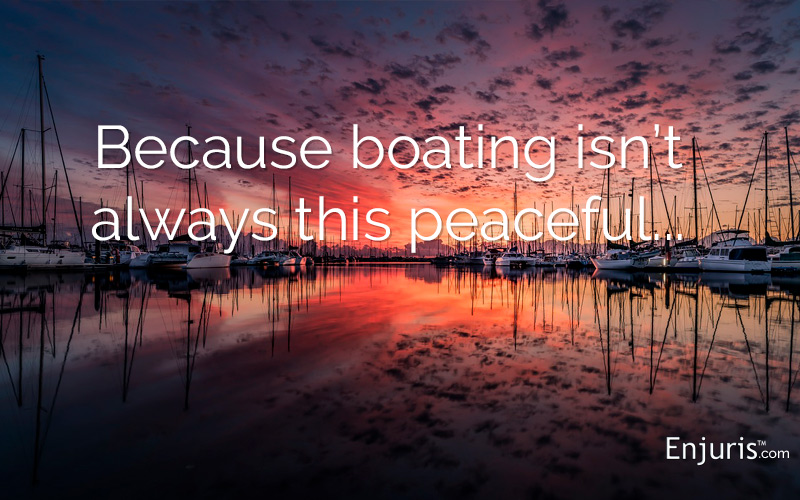Understanding liability and financial recovery for boating accidents in Georgia
A delight for tourists and residents alike, Georgia is home to beautiful lakes and beaches. Boating and water sports are popular activities in the Peach State. Lake Lanier, the Ogeechee river, and the Georgia coast are enjoyed by thousands of boating enthusiasts each year.
Boating can be a dangerous activity though, if the boating laws and safety guideline aren’t followed. The US Coast Guard reports that in 2017, there were approximately 1,600 accidents caused by boating collisions alone. If you or a loved one was injured or killed in a boating accident, a personal injury lawsuit may be your best chance at recovering compensation.
Types of boats and watercraft
Boating accidents may involve any type boat or watercraft and can take place in the ocean, a lake, river or any other substantial water source. Boats and watercraft commonly associated with maritime accidents include:
- Speed boats
- Yachts
- Fishing boats
- Jet-skis or jet propulsion vehicles
- Duck boats
- Kayaks
- Canoes
- Catamarans
- Seaplanes
- Sail boats
Causes of boating accidents
Operating a boat or a recreational vessel is a lot like driving a car. In fact, boats are considered motor vehicles according to Georgia law. Boat captains must handle their boat or watercraft as carefully as they would a car.
The operator must be aware of their surroundings, operate the boat in a responsible manner and have enough experience to know the proper handling of the vessel. Death and serious injury are strong possibilities if the safety guidelines aren’t followed. The US Coast Guard reported the following as the top 10 accident causes in 2017:
1. Operator inattention
2. Improper lookout
3. Operator inexperience
4. Machinery failure
5. Alcohol use
6. Excessive speed
7. Navigation rules violation
8. Weather
9. Hazardous waters
10. Force of wave/wake
Other common causes of boating accidents include:
- Operating under the influence of drugs
- Boating in areas where watercraft aren’t permitted
- Operating the boat alone
- Failure to pay careful attention to one’s surroundings
- Operating in a reckless, aggressive or careless manner
- Failure to maintain the equipment of the boat or watercraft
- Negligent acts or behavior in violation of water sport laws
Any of the above actions can lead to serious accidents or death. In most of the above cases, the boat operator is at fault. If you fear you caused your boat accident or at least are partly to blame, consult a personal injury attorney to see how fault may impact your claim for damages. As long as you were less than 50% at fault, you are still entitled to receive financial compensation in a lawsuit.
Negligence claims for boating accidents in Georgia
Legal claims for injuries in boating accidents are typically filed as negligence lawsuits. In a negligence case, four criteria must be satisfied in order for you be awarded damages. This procedure is the same whether you were the passenger on the boat that caused the accident or the vessel that was not at fault. These criteria are:
1. The boat operator owed you a duty.
This will typically be satisfied as all boat and watercraft operators owe each other a duty to share the waterways responsibly.
2. The operator breached that duty.
This is satisfied by showing that the captain did something that a reasonable operator would not have done. Boating at excessively high speeds is a good example of this.
3. The breach of the driver’s duty caused your accident.
In short, the criteria is satisfied if the operator’s actions were the direct cause of the accident. Following the above example, if the operator weren’t speeding, they wouldn’t have collided with another boat. Thus, their actions put him or her at fault.
4. You sustained injuries as a result of the driver’s actions.
This criteria is also met easily as you are likely suing the boat operator to recover compensation for medical bills, pain and suffering and lost wages.
Boating accident wrongful death claims in Georgia
Wrongful death lawsuits are common for boat accident victims as the injuries are often fatal. The US Coast Guard reports the following as the top five causes of fatalities in boating accidents:
1. Drowning
2. Trauma
3. Cardiac arrest
4. Hypothermia
5. Carbon monoxide inhalation
In many cases, the death of a passenger occurs due to the actions of the watercraft operator. If the boat operator was negligent, the family of the victim may file a wrongful death claim to receive damages such as:
- The loss of the decedent’s expected earnings;
- The loss of benefits (pension plans, medical coverage, etc.);
- Loss of inheritance;
- Medical bills and funeral expenses;
- Loss of care, guidance, advice, and nurturing from the decedent;
- Loss of consortium from a spouse;
- Loss of love and companionship; and
- Mental anguish, pain and suffering.
It’s also possible for the family to recover punitive damages if the boat operator acted in a particularly reckless manner. These damages are rare, but still possible.
It’s important to note that the fault of the victim could reduce or bar recovery in wrongful death cases. For example, knowingly riding in a boat with an intoxicated operator could dramatically reduce compensation or prevent financial recovery altogether. Additionally, as life jackets dramatically reduce the risk of death in boating accidents, a percentage of fault may be assigned to the plaintiff for not wearing one.
Boat owner liability in Georgia
Boat and watercraft owners must recognize that they could face liability even if they weren’t operating their vessel at the time of an accident. Georgia law§51-1-22 states that boat owners are liable for any accident where they gave consent for someone else to operate their vessel. This consent may be implied or expressed, which means that the owner doesn’t have to give oral consent in order to be liable. Thus, inaction puts a boat owner at the same amount of fault as directly allowing someone to operate the boat or watercraft.
Georgia law also assumes that immediate family members and spouses always have consent to use the boat or watercraft. As a result, you can be sued for a boat accident even if you weren’t aware a family member was using your vessel.
If, however, you were the victim of a boating accident, you need to be sure you name all possible defendants to recover the most compensation. A consultation with a Georgia personal injury lawyer who has experience in boating and watercraft accidents is your best chance to ensure that your case is handled properly.
See our guide Choosing a personal injury attorney.


